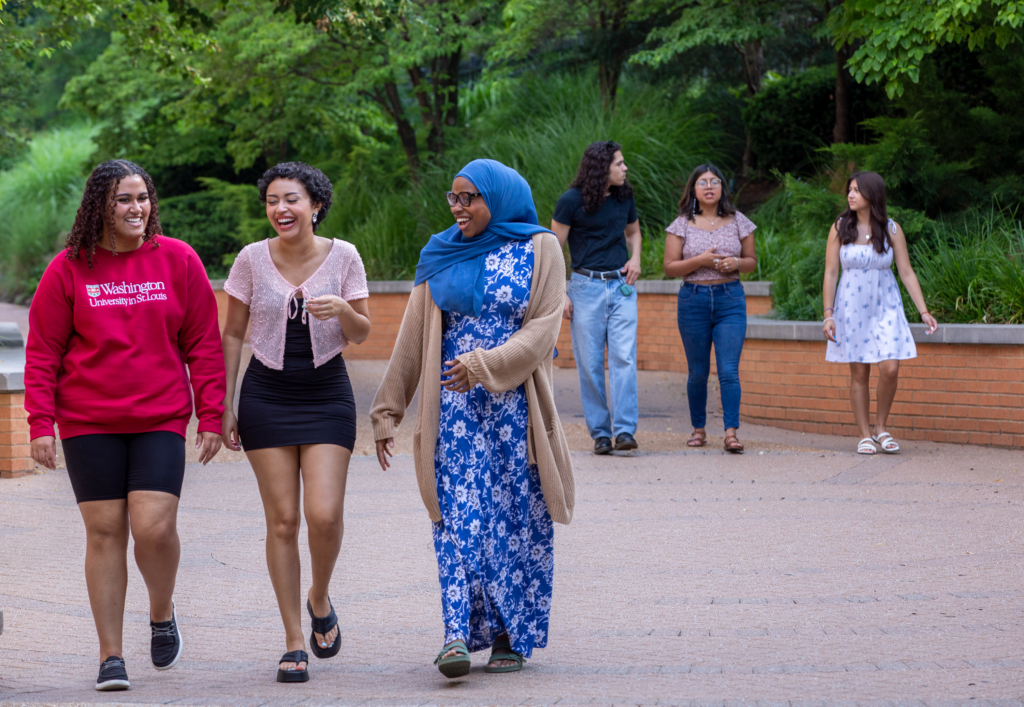Please use this chart as a guide throughout the year to gain a general understanding of what your student may be experiencing during their first few months at WashU.
You will also find some suggestions about how you can support your student throughout the first semester.
What’s happening
What your student may be experiencing
First weeks on campus
- Classes begin
- College schedule requires some adjustments
- New friendships form
- Excitement
- Nervousness
- Mild homesickness
Early September
- New routines develop
- Students explore cocurricular involvement and begin to find their place on campus
- Stress
- Anxiety
- Encourage your student to get off campus; Forest Park is a great suggestion
Mid-September
- The first set of exams is scheduled
- Students may struggle to balance academic, social and cocurricular commitments
- Tensions between
high school and college
relationships may emerge
- A need to develop different study habits
- A need to develop time management strategies
- Excitement about new relationships and sadness or anxiety about old relationships
Late September
- Initial excitement begins to fade
- Students may question
whether they belong - The pace of academic
work picks up - Callbacks and invitations to join
student groups begin to go out
- Self-doubt
- Feeling overwhelmed by academic work
- Students will benefit from a listening ear and encouragement
- Excitement about being selected to participate in a group or activity
- Sadness at being rejected from a
group or activity
Early October
- Fall Break
- Grades for first major exams and assignments are received
- Disappointment or discouragement
about academic performance - Many students experience a decline
in their academic performance early
in the first semester. Help your student see this as an opportunity
to make adjustments and encourage them to seek out campus resources for assistance
Mid-October
- Exams and major projects loom
- Students begin to prepare for spring course registration
- Feelings of relaxation from fall break fade
- Stress
- Anxiety
- Encourage your student to get off campus; Check out Explore St. Louis for ideas
- Remind your student to connect with their academic advisor about their educational plan
Late October
- Students learn more about and adjust to the campus culture
- New friendships continue to develop
- Mid-term papers, major assignments and exams are due
- Feelings of being overwhelmed may increase
- Your student may need reminders to take time for self-care (e.g., healthy meals, exercise, adequate rest)
Early November
- Students meet with academic advisor for course registration
- Students may begin to explore changes to their major field
- Grades for another round of exams or assignments are received
- Doubts about whether they are in the right major
- Relief/pride in the progress they have made
- Ongoing frustration with their academic performance
Mid-November/Break
- Students register for spring classes
- Due dates for term projects and final exams are on the horizon
- Excitement about seeing friends and family
- Exhaustion
- Anxiety about upcoming deadlines
- Help your students rest and recharge over the break.
Late November/Early December
- Classes wrap up for the semester
- Plans for changing academic divisions or majors may solidify
- Excitement about being home for winter break
- Feeling overwhelmed by multiple deadlines
- Feeling anxious about upcoming exams
- This is a good time to remind your student about positive self-care strategies
Mid-December
- Students are engaged in intense period of reading, writing and studying
- Reading Week & Final Exams
- Sadness about leaving campus and being away from friends
- Excitement about the opportunity to reconnect with family and friends
- The open schedule of Reading Week makes it easy to lose track of time. Encourage your student to make a plan for how they will use the time to their advantage
Content adapted from: Mullendore, R. H., & Hatch, C. (2000). Helping your first-year college student succeed: A guide for parents. University of South Carolina, National Resource Center for The First-Year Experience and Students in Transition.
